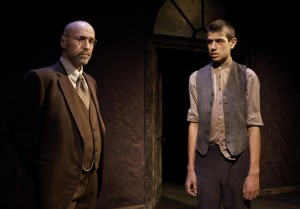I was excited to attend The Children’s Republic at the Tarragon Theatre. Although I try to see as much Canadian theatre as I possibly can, I had yet to see a piece from acclaimed writer Hannah Moscovitch. I also have a great attraction to theatre and art that deals with anything from the 1940’s.
Along for the ride, was my good friend Ryan. As this is piece about Polish Jews, it seemed particularly fitting. Ryan doesn’t have much family on his father’s side, as most of them were Polish Jews who were killed during this time.
The play does not suffer from lack of content. When researching the central character Janusz Korczak – author, doctor, and children’s rights activist – it is impossible not to be stirred. A man that history paints in the kindest of colours; Dr. Janusz Korczak devoted his life to the lives of orphaned children and even chose – major spoiler alert – to die with them rather than take the offers of freedom given to him by the Nazis.
But the truth is, I am speaking from history and not from the show, so I’ll go back to that. What is cool is that the show inspired me to go and look for the truth in the story. It is one we haven’t yet heard of, in a subject that has inspired so many heartachiningly beautiful bodies of work, theatrical or otherwise. It is a worthy story to tell, to be sure.
It is a play more playful than heartbreaking though, and the strength of this piece is really the acting and surprisingly less the writing. In fact, to me, it read more as a nicely inspired workshop of a piece rather than something polished enough to be ready for Tarragon’s stage. Director Alisa Palmer does an exemplary job with the script as it currently stands.
The quartet of talent from the young actors is definitely what moves this show along. Frail Mischa, spunky Mettya, tortured Israel, and sombre Sara are all endearing and watchable and it must be mentioned that Emma Burke-Kleinman’s Sara also plays a beautiful violin. There is no shortage of talent on this stage.
The grownups in this republic are equally strong. Kelli Fox’s Stefa is perfect blend of stern and soft, Amy Rutherford plays the right note as a sing-song children’s teacher who embodies the “seen and not heard” idea of children from that timeframe. Although it is a bit of a stretch to imagine Rutherford as anything close to Jewish.
Peter Hutt’s Dr. Korczark is the true star of this piece. His embodiment of the doctor is physically uncanny and he has a perfect blend of empathy and humility in the role. Ryan particularly liked his perfect Jewish “gallows humour”. We both agreed that there needed to be more of this central character to really go deeper than the banter of the many small scenes that make up this piece. We would have loved to see more of him as a man and the motivation behind his choices.
Sadly, this wasn’t the only missed connection. Ryan felt that the character of Israel didn’t completely add up at the end and I felt that the relationship between Mettye and Sara was weirdly and quickly forced. For a piece with so much implied weight, it felt light and clipped. Ultimately there were some great ideas and a good amount of historical inspiration but seemingly just not enough time in dramaturgy. The connections for us as the audience to the characters and also to the characters’ relationships just weren’t there. We sorely wanted them to be.
Camelia Koo’s set design was completely effective. The opening of the second act as the set moved into the Jewish ghetto was one of my favourite moments.
I do have a really unusual note and I have to say it; it’s something that I have never seen on stage in a very long time. In the long list of credits I didn’t see anyone responsible for the actor’s makeup, which leads me to believe that maybe the kids took care of this themselves. These kids are all believably thin and would convincingly create photographs from this time frame. Mark Correia’s Isreal looks as though he has leapt right out of a black and white photograph from a concentration camp.
However, the second half of the show, as a device meant to convey the deprivation of the Jewish ghettos, the kids emerged not just in tattered clothes but in tons of white face makeup with copious amount of reddish blush under their eyes. It might have simply been a bad mix of the makeup with the lighting used by Kimberley Purtell, but the effect was more Twilight than holocaust. The woman next to me actually stifled a giggle and made a joke about fangs.
All this aside, it is a worthy story Moscovitch tells and a testimony to the talent of our city. Don’t be surprised if a movie follows. Perhaps it was actually originally written for film all along as it nearly feels that way. That’s a film I would see for sure. I hope this isn’t the last we see of Dr. Janusz Korczak and his republic.
The Children’s Republic plays until Dec 18
Tickets are $15-38.00
Shows are Tues – Sun
Box Office: 416.531.1827
Tarragon Theatre
Tarragon Theatre
30 Bridgman Avenue, Toronto, ON, Canada, M5R 1X3


A 1990 Polish movie already exists entitled “Korczak”
It was directed by Andrzej Wajda